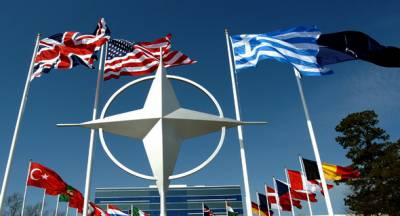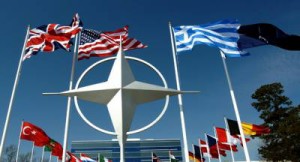
Jonathan Marshall
Jonathan Marshall is author or co-author of five books on international affairs, including The Lebanese Connection: Corruption, Civil War and the International Drug Traffic (Stanford University Press, 2012). Some of his previous articles for Consortiumnews were “Risky Blowback from Russian Sanctions”; “Neocons Want Regime Change in Iran”; “Saudi Cash Wins France’s Favor”; “The Saudis’ Hurt Feelings”; “Saudi Arabia’s Nuclear Bluster”; “The US Hand in the Syrian Mess”; and “Hidden Origins of Syria’s Civil War.”
Exclusive: Official Washington’s demonization of Vladimir Putin and the neocon "group think” about "Russian aggression” have fueled a reckless drive to move NATO forces up to Russia’s border, thus heightening risks of nuclear war and not serving real U.S. national interests, writes Jonathan Marshall.
Twenty-seven years after the fall of the Berlin Wall, NATO is back flexing its muscles as if nothing had changed since the days of the Soviet Union. Defense ministers from the enlarged, 28-member organization agreed recently to strengthen the alliance’s "forward presence” in Eastern Europe. If their new policy is endorsed at a summit in Poland this summer, NATO will begin deploying thousands of troops in Poland and the Baltic states, right up against Russia’s borders.
In other words, the Western alliance will redouble its military commitment to a Polish government whose right-wing, anti-Russian, and autocratic policies are so egregious that even the stanchly neo-conservative editorial page of the Washington Post saw fit to condemnthe new leaders’ encroachments on democracy and the rule of law.
Worse yet, NATO’s provocative commitment will include a potential threat to start World War III on behalf of that government. Most Americans are unaware that NATO’s policies, reaffirmed by the Obama administration, view nuclear weapons as a "core component” of the alliance’s capacity to repel even a conventional attack on one of its member states.
An accidental clash of forces, perhaps triggered by military exercises gone awry, could potentially lead NATO to use its nuclear weapons against Russian troops on Poland’s borders. Or, just as catastrophically, it could prompt Russian forces to attack NATO’s nuclear stockpiles preemptively.
Either scenario could trigger a much wider nuclear war. The British television channel BBC Two explored such a scenario, involving Latvia, in a chilling "war game” film that aired earlier this month.
Rather than let small, distant countries put U.S. national security at risk, the United States should, as an interim step short of disbanding NATO, demand the elimination of theater, or nonstrategic, nuclear weapons from NATO stockpiles. (Theater weapons are smaller and shorter in range than the large warheads carried by intercontinental ballistic missiles and long-range bombers.)
England and France would retain their independent, sovereign nuclear deterrents. But the United States would prevail on NATO to withdraw the 200 nuclear bombs it now stations at air bases in Belgium, Germany, Italy, the Netherlands and even Turkey. It would also forgo costly and destabilizing plans to deploy a new generation of highly accurate B61 bombs in Germany.
Eliminating NATO’s theater nuclear weapons would dramatically reduce security concerns about terrorist attacks, a threat highlighted by an Air Force security review in 2008. It would also eliminate them as tempting targets of a Russian preemptive attack in case a conflict begins to spin out of control.
A unilateral elimination of theater nuclear weapons would leave Western nations with thousands of nuclear warheads, enough to wipe out much of human civilization along with Russia. It would also leave the United States alone with an 8-to-1 advantage over Russia in military spending.
Political leaders from Belgium, Germany, Luxembourg, The Netherlands and Norway called for the removal of U.S. nuclear weapons from European soil in 2010, saying they had "lost all military importance” and had become a liability.
U.S. military leaders were inclined to agree. In 2008, the U.S. European Command, once a champion of theater nuclear weapons,acknowledged they were no longer important as a deterrent. When asked in 2010 if tactical nuclear weapons in Europe bought NATO any additional security, General James Cartwright, vice chairman of the Joint Chiefs of Staff, declared simply, "No.”
In today’s political climate, however, demonizers of Russia insist that self-interested steps to eliminate our unneeded weapons would somehow reward Vladimir Putin.
Last year, two leading congressional Republicans, Alabama’s Mike Rogers, chair of the House Armed Services Subcommittee on Strategic Forces, and Ohio’s Mike Turner, chairman of the Tactical Air and Land Forces Subcommittee, demanded that the United States deploy more nuclear weapons to Europe to counter Russia’s annexation of Crimea.
In 2014, Bush-era right-wingers John Bolton and John Yoo advocated reintroducing theater nuclear missiles into Europe. Either move would simply result in tit-for-tat responses by Russia, leaving both sides mired in a counterproductive arms race.
Other strategic analysts concede that "tactical nuclear arms in Europe are literally outdated”, obsolete both technically and in terms of strategy, but say that withdrawing them "would look like capitulation to Russia and thus encourage Putin to continue pressing his luck.” In other words, the United States should allow its security to be held hostage not only to the whims of Poland and Latvia, but also to Russia’s alleged perceptions.
In an ideal world, NATO would negotiate away its theater nuclear weapons as part of a bilateral treaty to reduce Russia’s own arsenal of smaller weapons, which may number 1,000 or more. But insistence on a negotiated deal has long been an excuse for inaction. And giving any single NATO member a veto will ensure that the alliance’s nuclear policies never change.
Russia’s numerical superiority, moreover, buys it no military advantage. If it launched nuclear weapons in Europe, odds are that the conflict would escalate quickly to engage the strategic nuclear forces of the United States, the UK, and France, leaving Russia a radioactive slag heap. That’s why Russian military doctrine firmly envisions using nuclear weapons only as a last resort, either to respond to a nuclear attack or to resist foreign aggression that "would put in danger the very existence of the state.”
Russia today hangs onto its theater nuclear weapons because its conventional forces have been radically weakened by the collapse of the USSR, the loss of control over Eastern Europe, and a succession of economic crises, including of late the collapse of oil prices.
In a recent commentary, Rep. Dana Rohrabacher, R-California, chair of the House Foreign Affairs Subcommittee on Europe, Eurasia, and Emerging Threats, dismissed claims of Russia’s growing threat to U.S. security as "belligerent nonsense.”
"It remains the case that NATO countries hugely outspend Moscow when it comes to military procurement,” he observed. "There is no evidence whatsoever that Russia, as when it was the Soviet Union, is embarked on a wanton course of global expansion. This is a country that unilaterally pulled its occupying troops out of Eastern Europe, a door closing on the Cold War.”
Rohrbacher added, "Obviously, some highly influential people can’t accept that and leave the Cold War behind, their mindsets and careers linked to a lingering enmity between the Kremlin and the White House. In particular, they can be found as think tank strategists and arms merchants.”




.jpg/250px-ElbeDay1945_(NARA_ww2-121).jpg)





